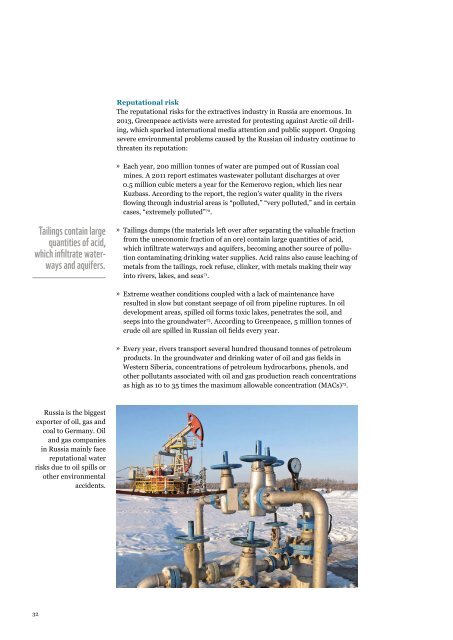YtDl2r
YtDl2r
YtDl2r
Create successful ePaper yourself
Turn your PDF publications into a flip-book with our unique Google optimized e-Paper software.
Reputational risk<br />
The reputational risks for the extractives industry in Russia are enormous. In<br />
2013, Greenpeace activists were arrested for protesting against Arctic oil drilling,<br />
which sparked international media attention and public support. Ongoing<br />
severe environmental problems caused by the Russian oil industry continue to<br />
threaten its reputation:<br />
»»<br />
Each year, 200 million tonnes of water are pumped out of Russian coal<br />
mines. A 2011 report estimates wastewater pollutant discharges at over<br />
0.5 million cubic meters a year for the Kemerovo region, which lies near<br />
Kuzbass. According to the report, the region’s water quality in the rivers<br />
flowing through industrial areas is “polluted,” “very polluted,” and in certain<br />
cases, “extremely polluted” 70 .<br />
Tailings contain large<br />
quantities of acid,<br />
which infiltrate waterways<br />
and aquifers.<br />
»»<br />
Tailings dumps (the materials left over after separating the valuable fraction<br />
from the uneconomic fraction of an ore) contain large quantities of acid,<br />
which infiltrate waterways and aquifers, becoming another source of pollution<br />
contaminating drinking water supplies. Acid rains also cause leaching of<br />
metals from the tailings, rock refuse, clinker, with metals making their way<br />
into rivers, lakes, and seas 71 .<br />
»»<br />
Extreme weather conditions coupled with a lack of maintenance have<br />
resulted in slow but constant seepage of oil from pipeline ruptures. In oil<br />
development areas, spilled oil forms toxic lakes, penetrates the soil, and<br />
seeps into the groundwater 72 . According to Greenpeace, 5 million tonnes of<br />
crude oil are spilled in Russian oil fields every year.<br />
»»<br />
Every year, rivers transport several hundred thousand tonnes of petroleum<br />
products. In the groundwater and drinking water of oil and gas fields in<br />
Western Siberia, concentrations of petroleum hydrocarbons, phenols, and<br />
other pollutants associated with oil and gas production reach concentrations<br />
as high as 10 to 35 times the maximum allowable concentration (MACs) 73 .<br />
Russia is the biggest<br />
exporter of oil, gas and<br />
coal to Germany. Oil<br />
and gas companies<br />
in Russia mainly face<br />
reputational water<br />
risks due to oil spills or<br />
other environmental<br />
accidents.<br />
32


